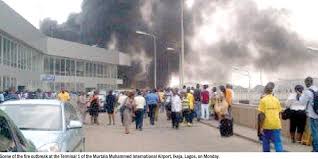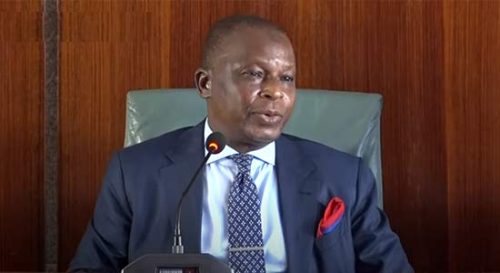Wike’s bold crusade: From insecurity to safety in Abuja

This feature explores how Wike’s leadership is reshaping Abuja, with a relentless push toward making the city safer for all. Writes Ukpono Ukpong
In the face of rising insecurity, Abuja, the Federal Capital Territory (FCT), had long been caught in the grip of fear, its streets once a breeding ground for criminals who held the city in a stranglehold. But with Nyesom Wike’s appointment as the Federal Capital Territory (FCT) Minister, a new era began.
Wike’s bold, hands-on approach has been a game-changer, reshaping the security landscape with precision and determination, turning Abuja into a city that is no longer passive but proactive in combating crime. His innovative measures, strategic partnerships, and unwavering resolve have redefined what it means to secure a capital city, breathing new life and hope into its residents.
The Arewa Youth Assembly, in its recent declaration, applauded Wike’s swift, strategic interventions, particularly, his approval for joint security task forces made up of all relevant agencies in the FCT. These forces are tasked with dismantling one-chance syndicates, armed robbers, kidnappers, and every criminal lurking in the shadows of Abuja.
One of Wike’s star moves, includes implementing a digital monitoring and control system within the city’s transport network, which has proven to be revolutionary. Through this, Uber drivers are profiled and tracked, adding a crucial layer of security to daily commutes. The FCT Minister has also ensured that each of the six area councils meets monthly to discuss and strategize their own localized security plans. It’s a multifaceted approach designed to choke out criminal activity at every level.
READ ALSO: Optimism, Anxiety as Edo Governorship Election…
However, Wike’s actions didn’t stop there. In a fiery defense of his administration’s N1.1 trillion budget before the Senate Committees on FCT and Area Councils in March 2024, the minister made an impassioned plea for lawmakers to approve a dedicated security vote for the territory. He argued that such a fund would allow swift action in times of crisis, without the slow crawl of bureaucracy or the compromise of sensitive information.
President Tinubu, also deeply committed to eradicating criminal gangs and terrorist groups, echoed Wike’s sentiments in early 2024, signaling that no stone would be left unturned in securing the nation. This partnership between the President’s vision and Wike’s tireless execution has turned Abuja’s fight against crime into a coordinated, nationwide battle.
Wike’s efforts have reached beyond the city’s borders. He forged a powerful alliance with the neighboring states of Nasarawa, Kogi, Niger, and Kaduna, combining resources, intelligence, and logistical support to fortify security across the region. This collaboration acknowledges that crime is often a cross-border issue, and to defeat it, we must be united.
Traditional leaders too have joined the fight. Wike knows that their influence and knowledge of their communities are critical in identifying criminals hiding in plain sight. During a pivotal meeting with these leaders, he laid out his blueprint for success:
“They (drivers) must be profiled so that they are known. Who are they? Are they from our communities? This is key so that we won’t say we want to solve a problem and then cause another one. If there are things you think we should do too, we are willing to partner with you, so that the challenges we are facing now will be a thing of the past.
“You must work hard because insecurity is not written on anybody’s face. Anyone can be a victim, and that is why we must do everything possible to ensure that our subjects are not victims of these criminals,” Wike told the traditional leaders.
In another bold move, Wike vowed to continue his administration’s aggressive campaign to demolish shanties in Abuja. These are crime dens where criminals find shelter and operate with impunity.
These efforts, though controversial, are a clear message to lawbreakers that there is no safe haven in the capital.
To further solidify his partnership with security agencies, Wike procured and distributed 50 state-of-the-art operational vehicles. These aren’t just any vehicles; they are fully equipped with advanced communication gadgets to boost the effectiveness of security operations. Twenty-four vehicles were handed to the FCT Police Command, while other agencies such as the Nigerian Security and Civil Defence Corps, State Security Services, Nigerian Army, and others received vital reinforcements.
Wike is unwavering in his belief that the government must provide the necessary resources to enable security agencies to do their job effectively. He is determined that Abuja’s residents will be able to sleep soundly, without fear of the next violent crime.
Security experts are already hailing the FCT Minister’s strategy. The establishment of new police divisions and support for vigilante groups will further fortify the city’s defenses. Local policing efforts will be enhanced, fostering closer relationships between police officers and residents, who will be empowered to report and solve crime together.
“We can not say we have gotten it 100 per cent right because no society is free of crime. But are there differences? Certainly, yes, and you can attest to the fact that it is no longer what it used to be,” Wike said, sounding confident as he surveyed the changes he’s instigated in Abuja’s security landscape.
When speaking to a diplomatic delegation from Hungary, Wike confidently declared, “By the grace of God, we have been able to reduce the level of insecurity. You can attest to the fact that Abuja is safer now because of the way we have been able to tackle the issue.”
The proof, as it turns out, is in the data. A recent report from the Armed Conflict Location and Event Data (ACLED) confirmed Wike’s claims, showing a marked reduction in violence, fatalities, and abductions in Abuja since March 2024.
This achievement is all the more significant when considering Abuja’s history. A 2020 report from SB Morgan ranked the city 11th in the country for frequent abductions. But under Wike’s leadership, the landscape has shifted, the crime rates are falling, and the once-unfathomable nightmare of kidnapping is becoming a thing of the past.
Even Wike’s plan to remove beggars from the streets has sparked fierce debate. Critics argue that this measure is harsh, but the minister remains resolute, framing it as a necessary step for improving the city’s security and maintaining its image.
As Wike continues to navigate the delicate balance of securing Abuja, one thing is clear, his leadership has breathed new life into a city once overshadowed by fear.
However, this battle is far from over. For the minister’s efforts to truly succeed, he must continue to engage with the residents, creating a shared sense of responsibility between the government and the people. Only then will Abuja’s transformation into a safe, secure metropolis be complete.










